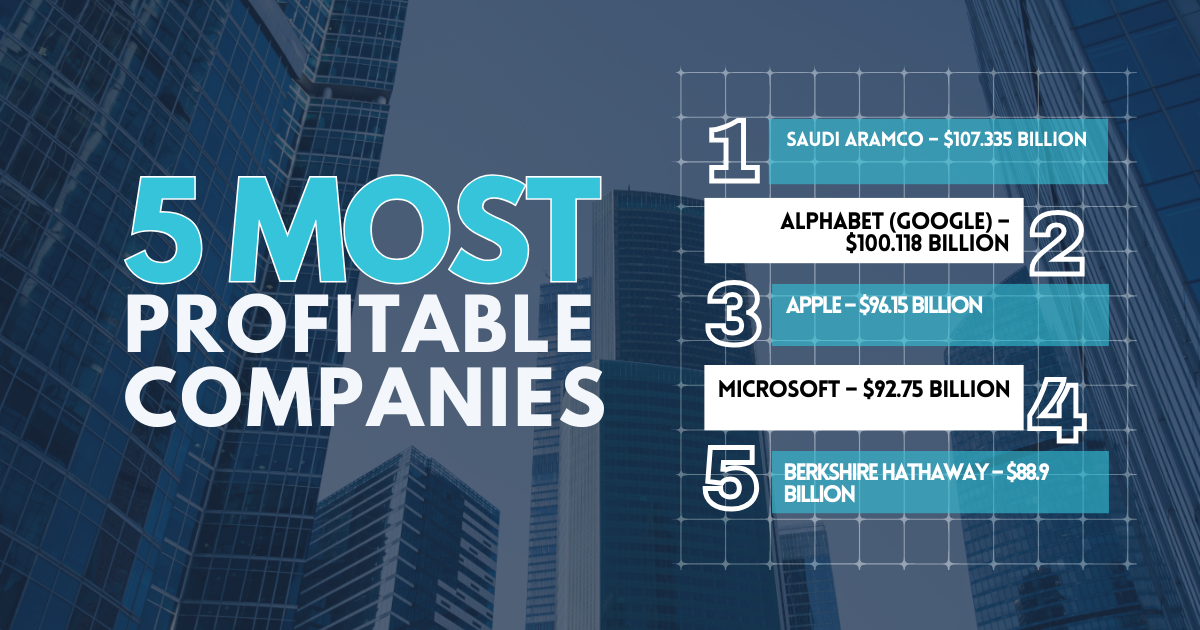This simple truth underlines how businesses achieve sustained success.
In 2025, Aramco planned $52-58 billion in capital investments, demonstrating a commitment to growth and resilience. These numbers show how prioritizing customers and employees leads to remarkable results.
So, what’s the secret behind their success?
What is Profit for a Company?
Profit is the remaining money in your business account after covering all expenses. It is calculated by subtracting production, delivery, and operational costs from the income generated through selling products or services.
Unlike revenue and cash, profit represents your business’s actual earnings. Revenue is the total income from sales before deducting any expenses, while cash refers to the available money currently in your business account.
5 Most Profitable Companies
Success in business isn’t just about short-term gains—it’s about sustained profitability, innovation, and strategic planning. Here are the five most profitable companies, leading their industries with remarkable earnings and innovative approaches:

1. Saudi Aramco – $107.335 Billion
Saudi Aramco continues to lead the global market in profitability, with a staggering net income of over $107 billion. As the dominant force in the oil and gas industry, Aramco benefits from vast crude reserves, efficient operations, and a strong presence in the energy sector.
Despite fluctuating oil prices, the company remains a powerhouse, investing in refining, petrochemicals, and renewable energy initiatives to ensure long-term growth. Its continued expansion into international markets, including key investments in Asia and Europe, strengthens its global influence.
2. Alphabet (Google) – $100.118 Billion
Alphabet, the parent company of Google, has consistently increased its profitability, surpassing $100 billion in net income. Google’s dominance in online search, digital advertising, and AI-driven technologies contributes significantly to its financial strength.
Beyond advertising revenue, Alphabet has expanded into cloud computing, AI development, and autonomous vehicle technology through Waymo, positioning itself for sustained growth in the tech industry. Despite regulatory challenges and competition, Alphabet’s diversified revenue streams continue to fuel its profitability.
3. Apple – $96.15 Billion
Apple remains a leader in consumer electronics and software services, reporting over $96 billion in net income. With record-breaking sales of the iPhone 16, Apple Watch Series 10, and the latest MacBooks, Apple continues to capture the global market.
The company’s investment in AI-driven features, enhanced security, and premium hardware keeps demand high. In addition, Apple’s ecosystem—spanning the App Store, iCloud, and Apple Music—ensures consistent recurring revenue. With its market value exceeding $3.4 trillion, Apple remains one of the most valuable and profitable companies worldwide.
4. Microsoft – $92.75 Billion
Microsoft’s strategic focus on AI, cloud computing, and enterprise solutions has propelled its net income to over $92 billion. With Azure cloud services growing by 30% year over year, Microsoft remains a dominant player in cloud computing.
The integration of AI across its software platforms, including Microsoft 365, Bing, and Copilot, has driven innovation and increased user engagement. Microsoft’s commitment to enterprise software, gaming (Xbox), and cybersecurity ensures a well-diversified revenue model, securing its place among the most profitable companies.
5. Berkshire Hathaway – $88.9 Billion
Led by legendary investor Warren Buffett, Berkshire Hathaway’s portfolio spans insurance, energy, consumer goods, and transportation, contributing to nearly $89 billion in net income.
Unlike tech giants, Berkshire Hathaway relies on traditional industries and strategic investments, including stakes in companies like Apple, Coca-Cola, and American Express. Its ability to generate long-term returns through value investing and risk management solidifies its reputation as one of the most profitable conglomerates in the world.
5 Business Strategies from Profitable Companies
Top companies succeed with smart ideas and strong growth plans. Their strategies can help businesses improve and grow over time. Here are five important strategies to learn from industry leaders:

1. Customer-Centric Approach
Successful companies prioritize their customers by delivering outstanding experiences and products that meet their needs. Amazon, for example, has built its empire by focusing on customer satisfaction, fast delivery, and personalized recommendations.
Businesses that listen to their customers, collect feedback, and continuously improve their offerings are more likely to build long-term loyalty and repeat business.
2. Innovation and Adaptability
Market leaders invest in continuous innovation to stay ahead of competitors. Apple exemplifies this by consistently releasing groundbreaking products, from the iPhone to wearable technology. Companies that embrace change, invest in research and development, and adapt to new trends maintain a strong market presence and drive long-term success.
3. Data-Driven Decision Making
Profitable companies use data to guide their strategies and improve efficiency. Google thrives on data analytics, using search behavior and machine learning to refine its services and advertising platforms.
Businesses that leverage data for customer insights, market trends, and performance optimization can make informed decisions that drive revenue growth and operational success.
4. Strong Brand Identity and Marketing
A powerful brand helps companies build trust and differentiate themselves in the market. Coca-Cola, for example, has created an emotional connection with consumers through consistent branding and memorable marketing campaigns.
Companies that invest in brand storytelling, digital presence, and customer engagement create a lasting impression and maintain a loyal customer base.
5. Strategic Partnerships and Expansion
Top companies scale effectively by forming strategic alliances and expanding into new markets. Microsoft, for instance, has partnered with numerous tech firms and cloud providers to enhance its ecosystem. By collaborating with key players, businesses can access new customer bases, strengthen their market position, and unlock new revenue streams.
The Mindset Behind Profitability
The most profitable companies don’t rely on luck—they master the art of strategy. They don’t follow the crowd; they lead it. Every move is calculated, every decision driven by vision, innovation, and customer demand. Their success isn’t just about selling—it’s about solving problems, shaping industries, and staying ahead of the curve.
But here’s the challenge: Are you thinking big enough? Many businesses fail, not because they lack resources, but because they play too small. Profitable companies take risks, embrace change, and turn obstacles into opportunities. They don’t just adapt to the future; they create it.
If you want to build a business that lasts, ask yourself: Are you making decisions that push you forward, or are you holding back out of fear? The companies at the top didn’t wait for success to find them—they went after it. It’s time to do the same.
FAQs
What role does innovation play in the success of leading companies?
Innovation enables companies to develop new products, services, and processes that meet changing market demands. It fosters competitiveness and allows businesses to differentiate themselves, driving growth and profitability.
Why is a customer-centric approach significant for businesses?
A customer-centric approach ensures that products and services meet the evolving needs and preferences of consumers. By focusing on customer satisfaction, businesses can build loyalty, encourage repeat business, and enhance their market position.
Which company generates the highest profit per employee?
In 2023, the most profitable companies per employee span various industries. Leading the pack is Energi Danmark Group, which dominates globally with an outstanding $5.7 million profit per employee, solidifying its position at the forefront of the energy sector.
Which company offers the highest salaries?
Some of the highest-paying companies include tech giants like Amazon, Apple, Google, and Microsoft. Major financial firms such as JPMorgan Chase and Goldman Sachs also rank among the top for competitive compensation.
